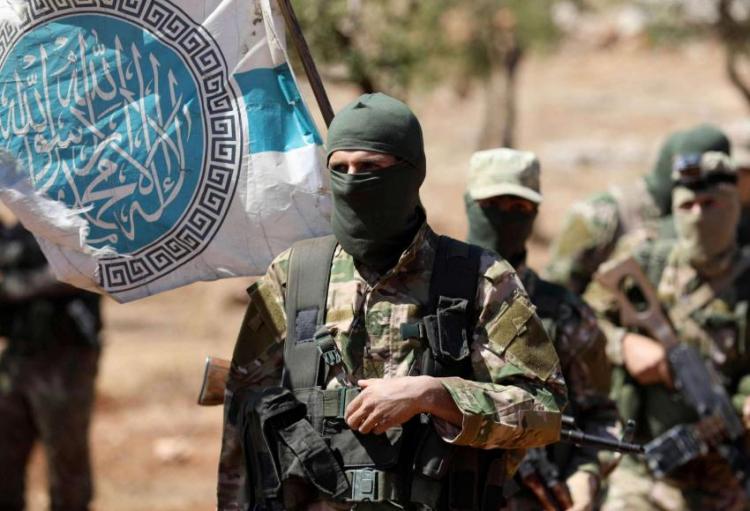Mehmet al-Yanayri
The ambiguity of Turkey’s policies towards northern Syria, which accompanied the confusion over details of the security mechanism and its interpretations between Ankara and Washington, besides Turkey’s threats about resorting to special options with U.S. procrastination in this file is reinforced and accompanied by the ambiguity of the Turkish stance regarding Hayat Tahrir al-Sham HTS (alQaeda’s affiliate, previously known as al-Nusra Front), which Ankara had earlier tried to contain and find solutions to its sites in northern Syria, to no avail.
The relationship between Turkey and HTS went through different and fluctuating stages, from hostility and skepticism to coordination and the Turkish support, in light of mutual interests.
This relationship was based mainly on field developments and changes in Turkish foreign policy in addition to Ankara’s relations with international powers, especially the United States and Russia.
While the problem of HTS remains as one of the most controversial issues in northern Syria, questions arise about the Turkish role, whether Turkey does not want to end HTS or it cannot, in the light of special calculations that prevents it.
The dissolution of HTS was a headline that topped various media outlets regarding an agreement between Turkey and Russia linked to this framework, as well as many reports were published about the Turkish pressure on HTS to dissolve itself.
An opposition military source told North-Press: “We have not received any details in this regard, and the situation as it is between HTS and Turkey, so far”.
There are doubts about the extent to which Turkey could take this step, and the use of this file as a card in its dialogue with the international powers regarding the resolution in Syria, and other files related to the Turkish foreign policy.
The source said: “our information confirm that since the first Astana Talks, the issue of dismantling HTS and other armed groups arose, in addition to the forced negotiations with them about this regard. However, none of this has happened, perhaps due to the harmonization and the political interests”, without giving further details regarding those interests nor about the participant parties.
Late time
The Syrian oppositional political analyst and adviser, Dr. Marah al-Beqai, said in a special statement to North-Press: “If Turkey now wants to resolve HTS, I think it’s too late”, she added: “The international community, the United Nations and the Syrian opposition have long called for the separation between the FSA, which is a fighting force in the name of the moderate and legitimate of the opposition and the terrorist groups that have infiltrated the ranks of fighting against the Syrian government forces for their own interests and the interests of countries that support them”.
“The separation should have been done a long time ago, and funding for these groups should have been ceased since a long time”, said Bekai, “funding comes from multiple quarters and from multiple countries, without this funding and logistical support, in particular, it would not be able to sustain this force in Idlib”.
“Turkey can now curb these terrorist groups because it has military posts in Idlib, which can prevent these groups from conducting operations in the region, and can also prevent arms smuggling into them via the long borders with Idlib”, she added.
Al-Bekai concluded: “We hope that Turkey plays this role, in order to recover the region’s power, especially since Idlib directly affects Turkey through the long borders, and through the presence of the refugees and camps on the borders between Idlib, northern Syria, and Turkey”.
Turkish failure
The Syrian opposition member Samir Nashar believes that they can’t say that Turkey does not want to end the presence of HTS, but more precisely that it cannot basically finish that file”, he added: “Turkey tried a lot during the previous stages since signing Sochi agreement, but it has failed despite the dialogues and the attempts to integrate HTS into the National Liberation Front more than once”.
“Militarily, Turkey cannot engage itself in a conflict with radical Islamists, it had previously tried by Ahrar al-Sham and Nour al-Din al-Zenki armed groups, but they were curtailed and marginalized.
In addition to the repercussions of the military conflict between Turkey and the Islamists of tarnishing Turkey’s and Erdogan’s image in the Islamic world besides its impact on the Turkish interior.
In light of these facts, the northwest of Syria remains open to many scenarios, linked to Turkey’s stance region HTS issue, and whether it can work to dissolve it or not, at a time when HTS seems at its most critical stage, facing unprecedented pressure that threatens it to be expelled permanently from the Syrian territories, especially with the lack of a popular incubator.

